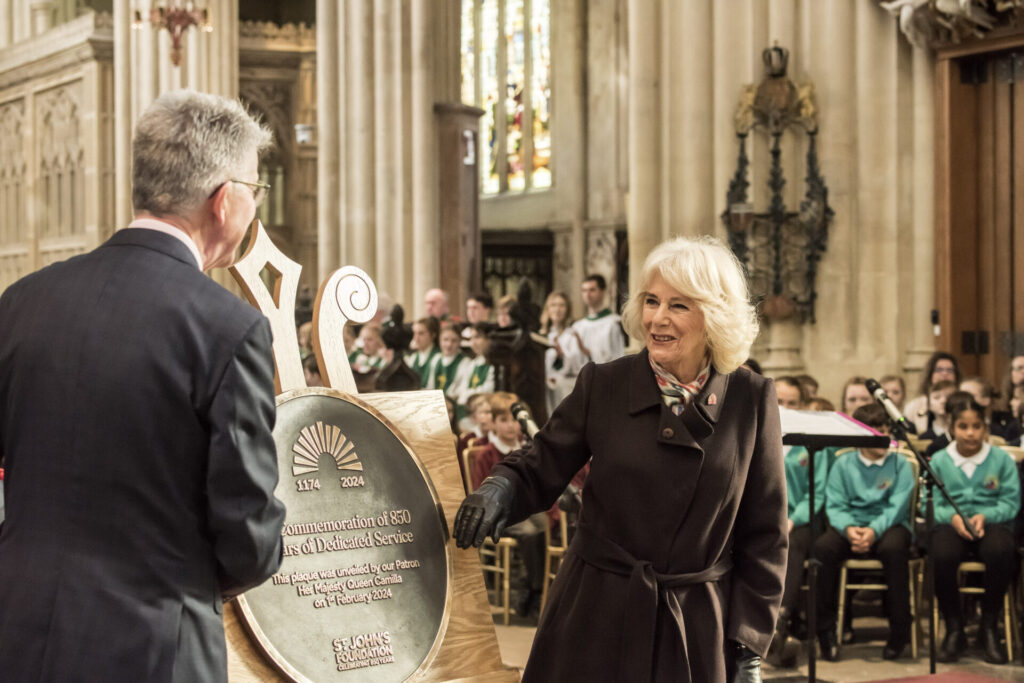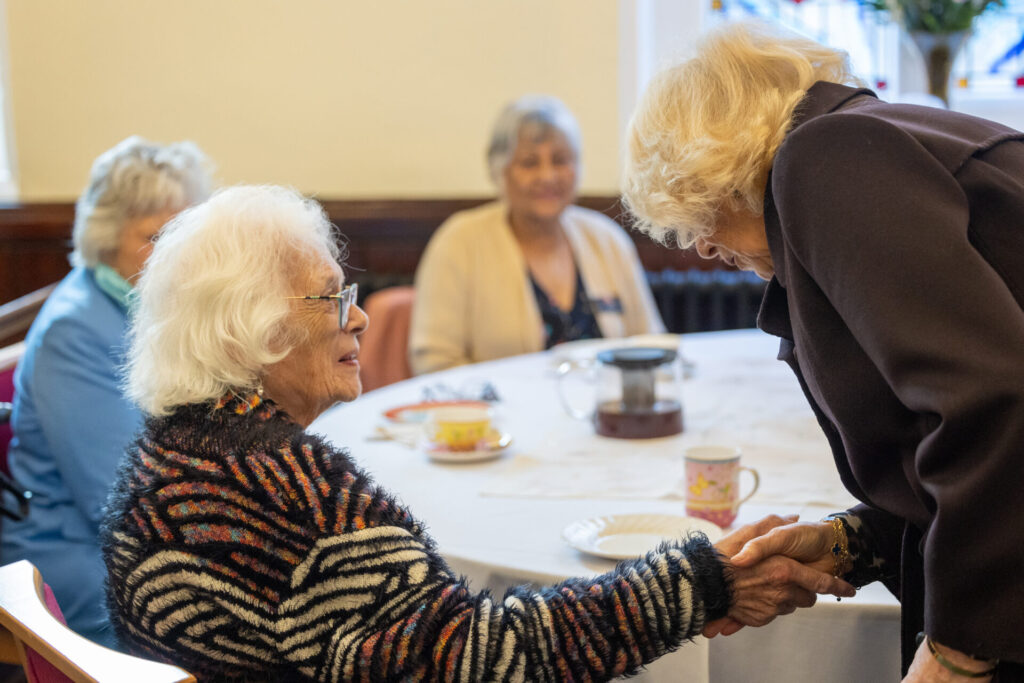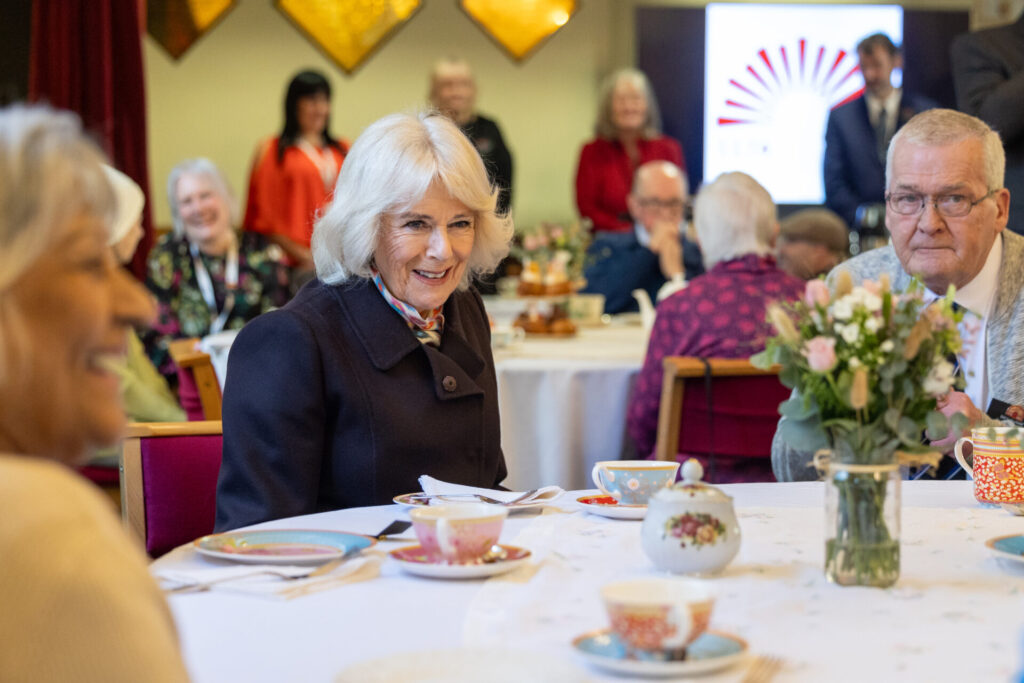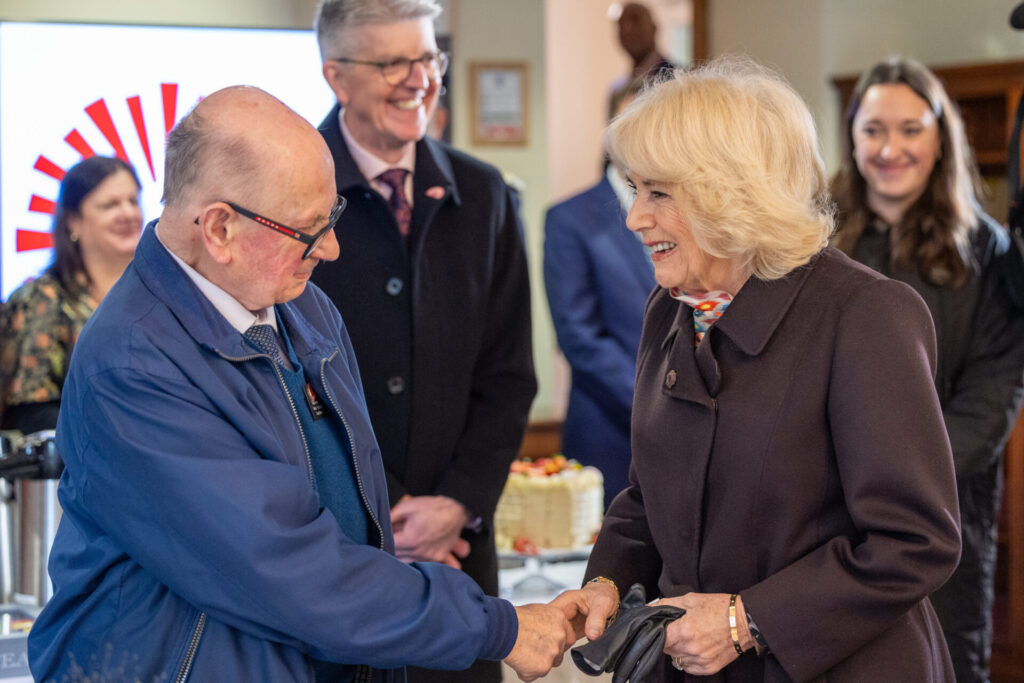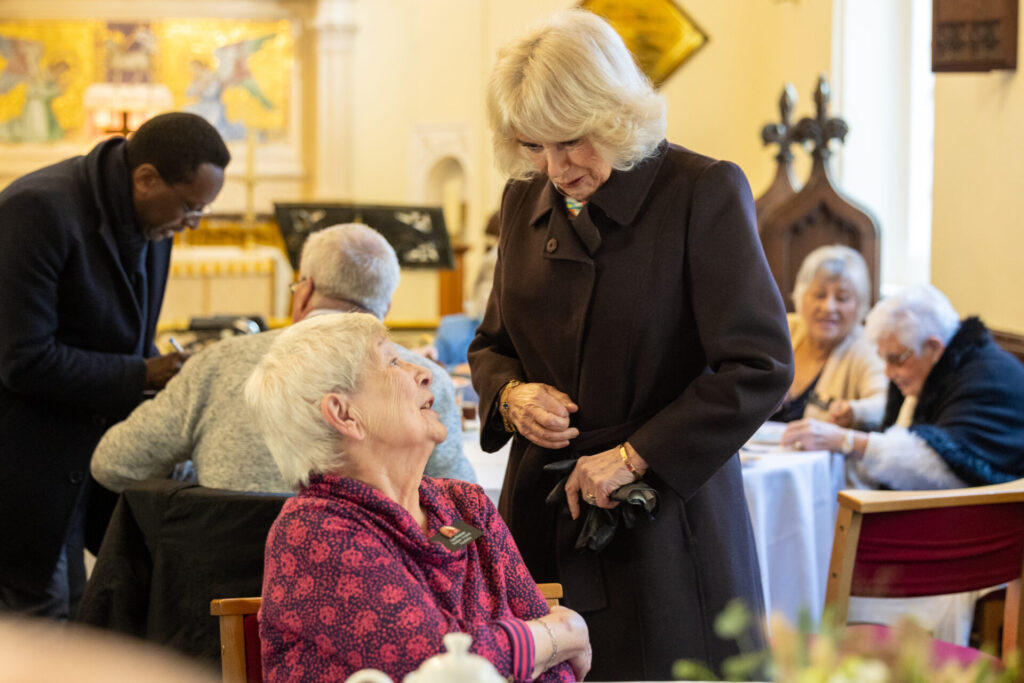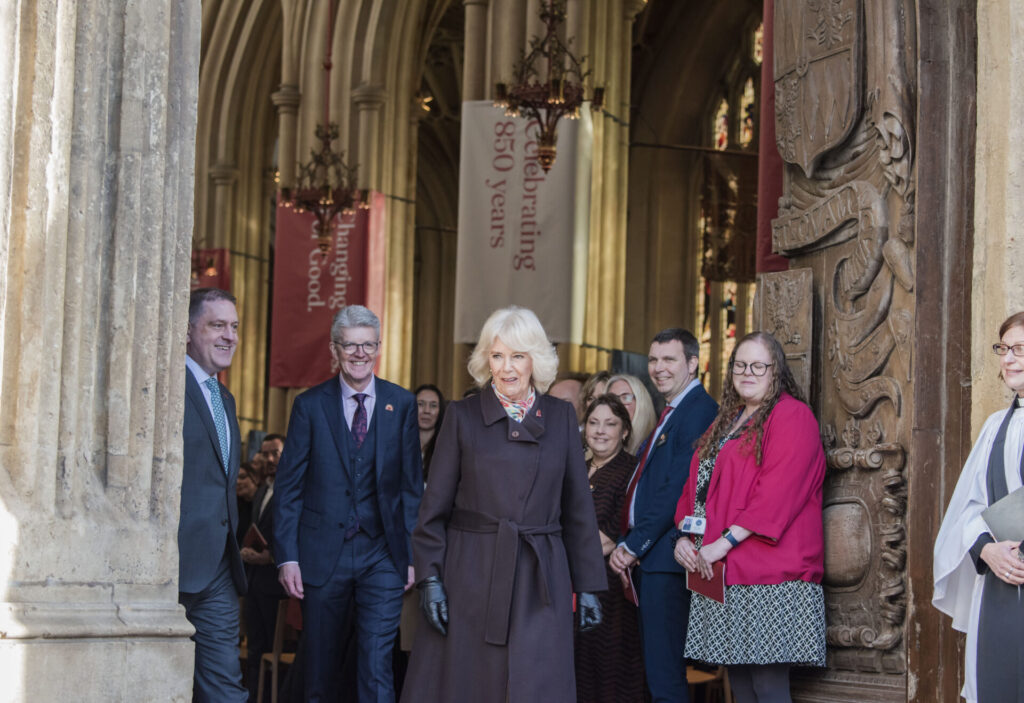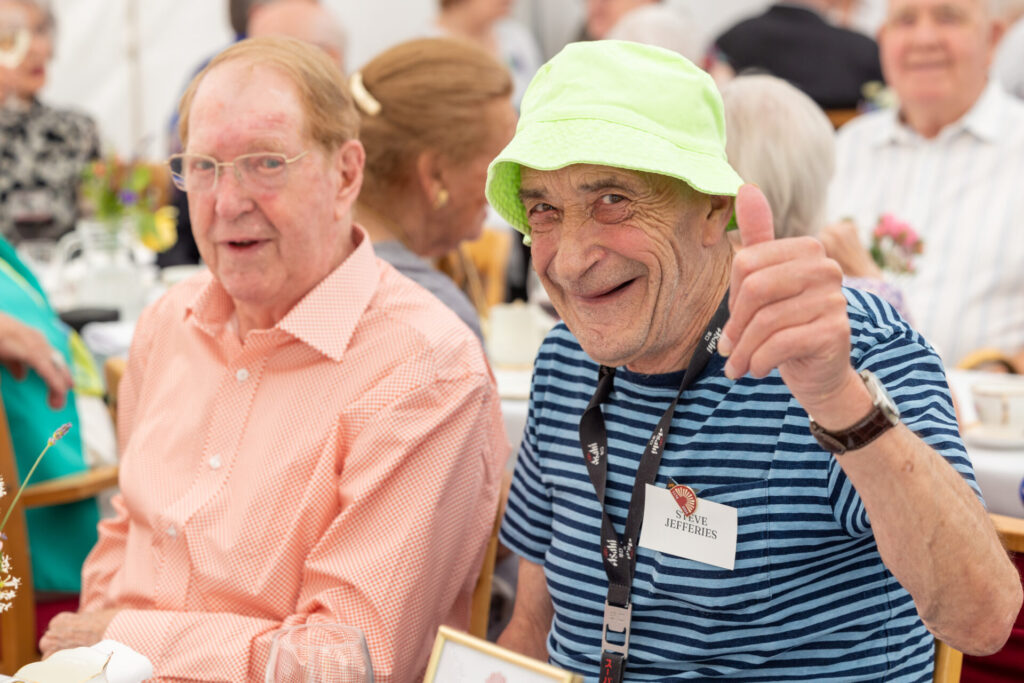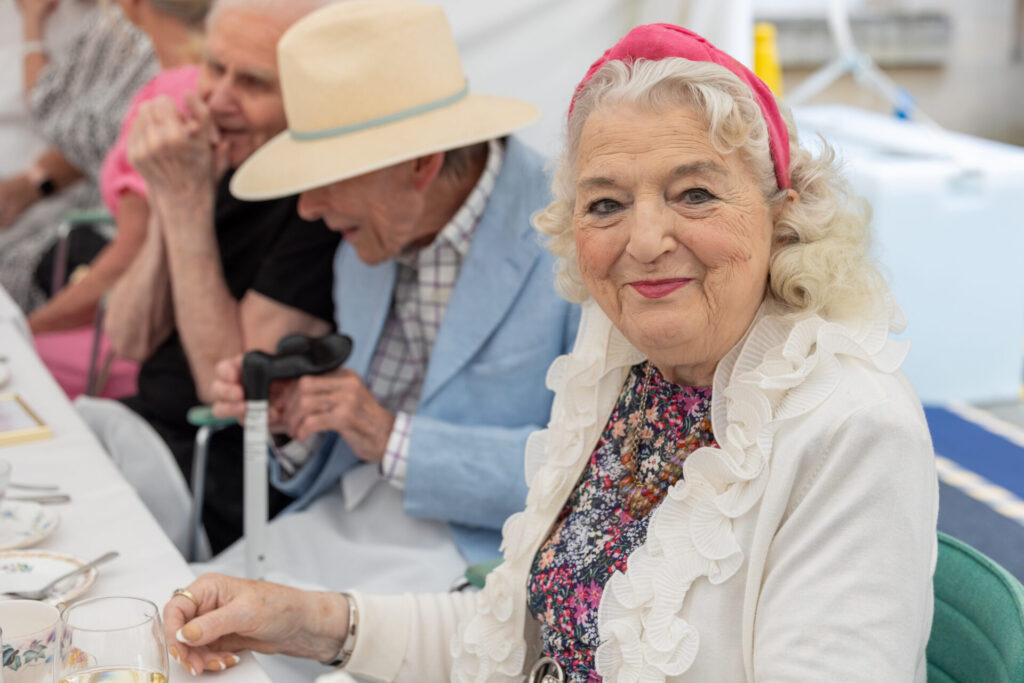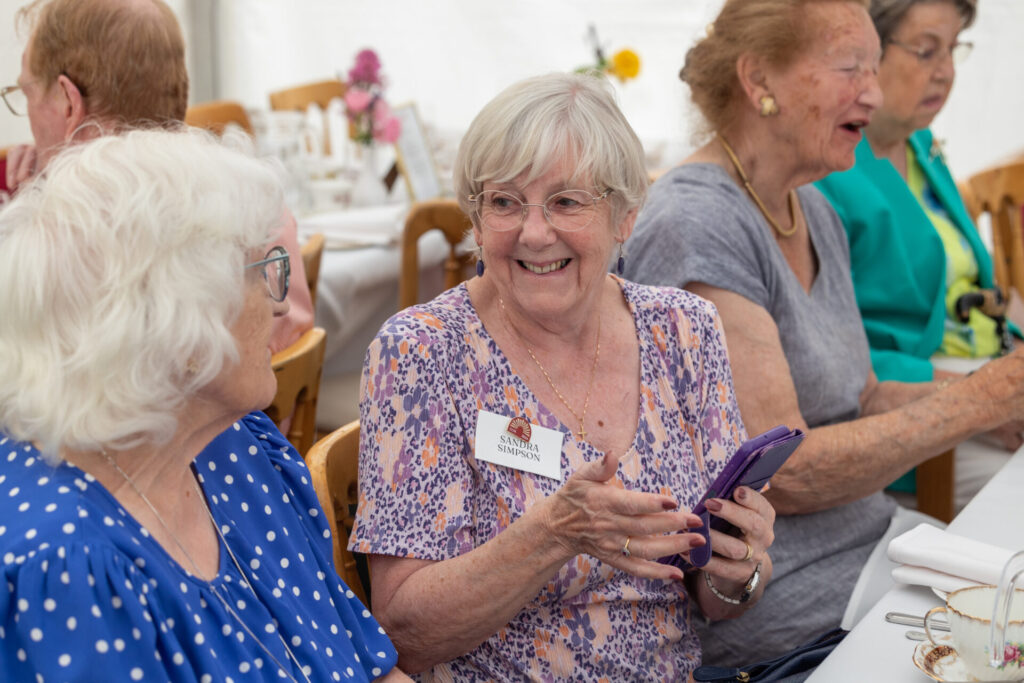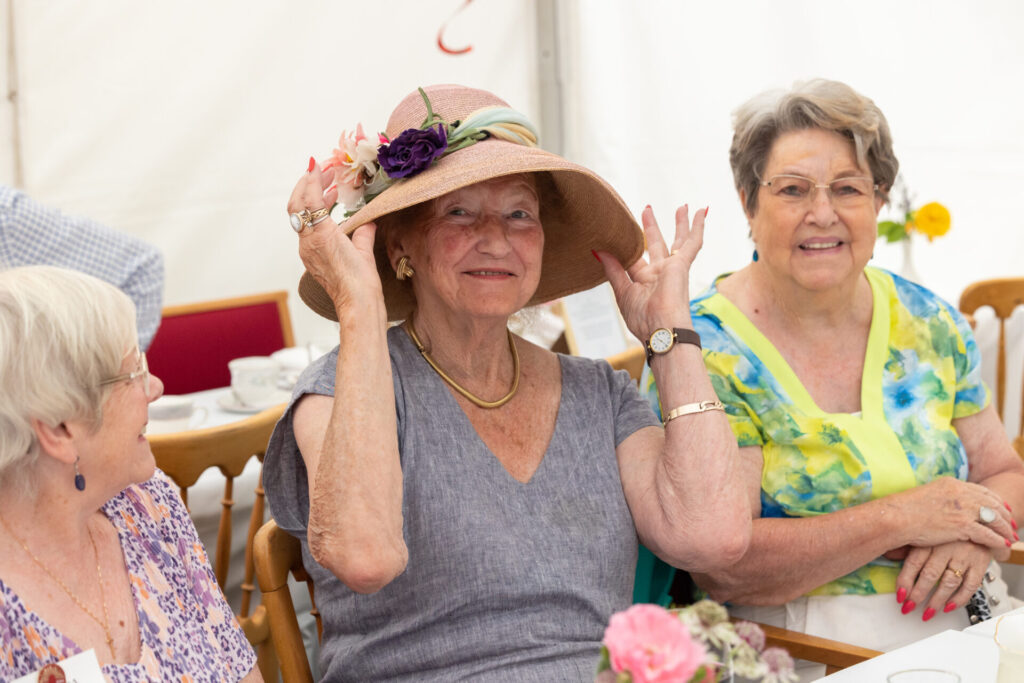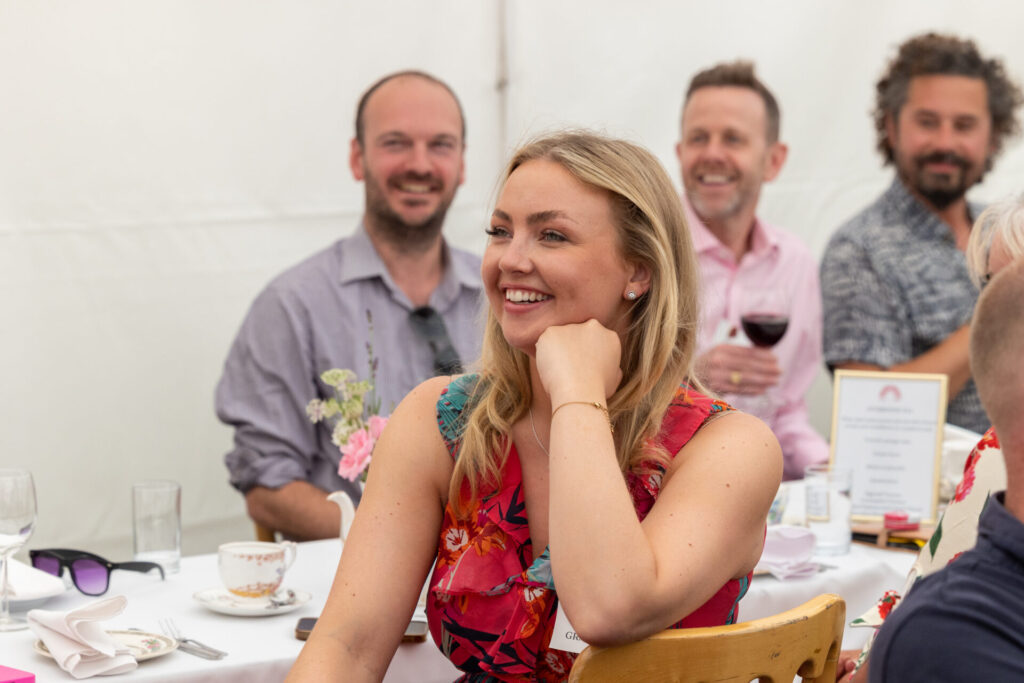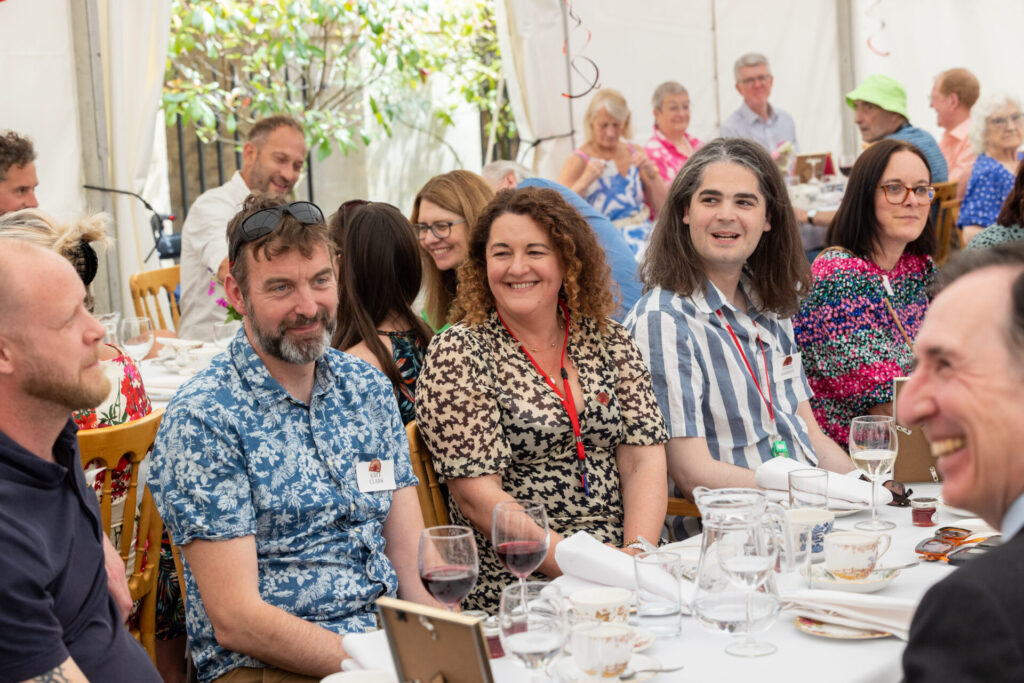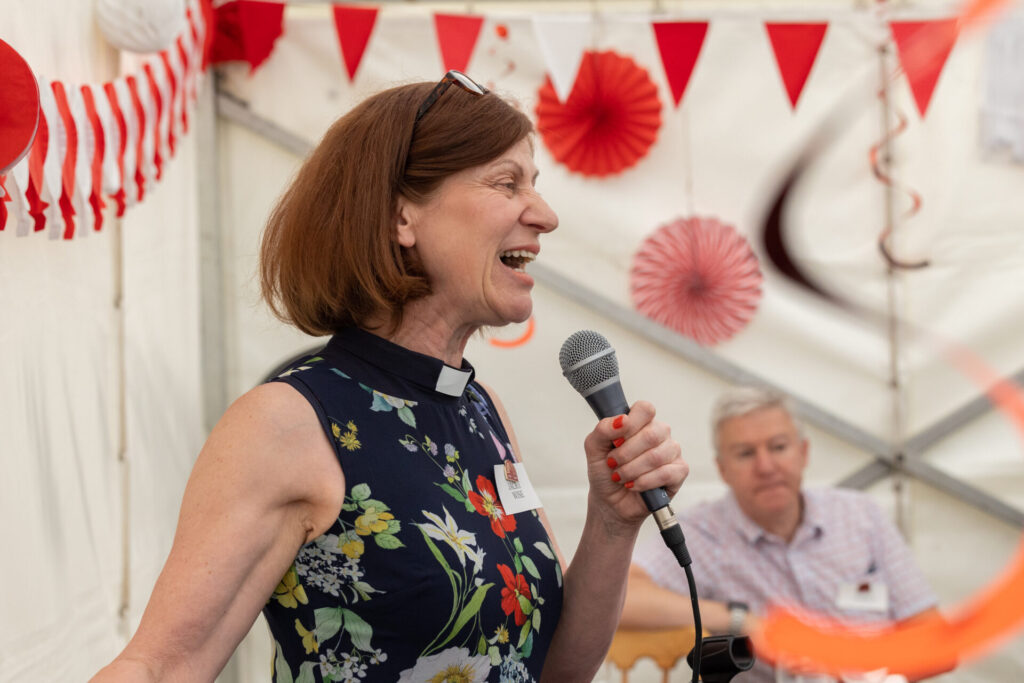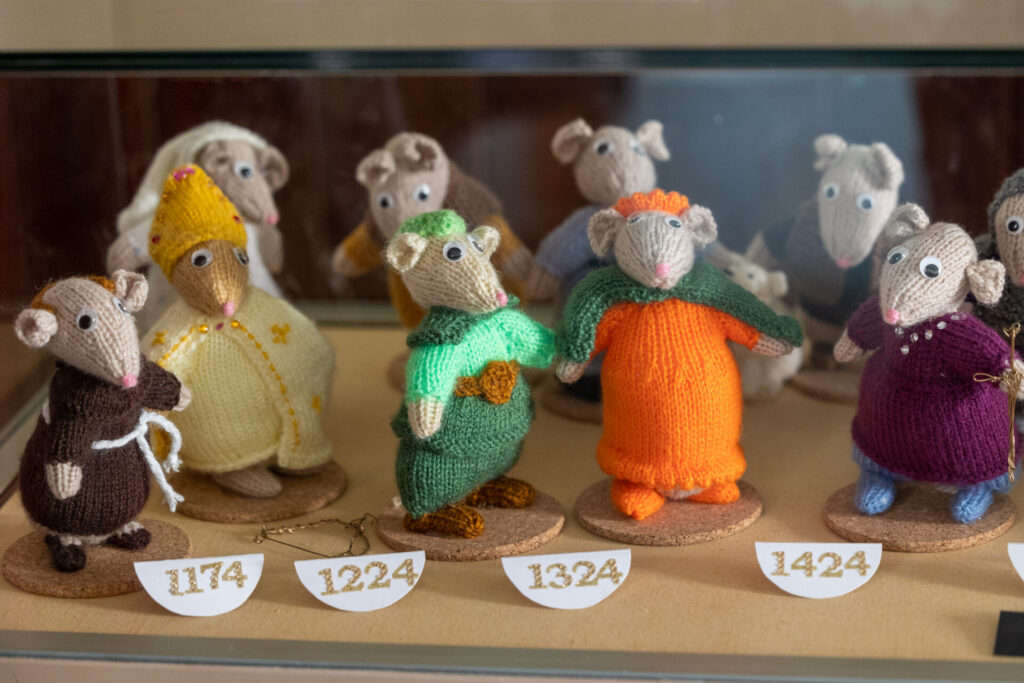In a world where ageism often manifests as negative stereotypes towards older individuals, it’s refreshing to see how the residents at St John’s defy these preconceptions and continue to live life to the fullest. Ageism can lead to feelings of isolation and loneliness, as well as to physical constraints imposed by societal and personal attitudes. However, our residents continue to show us the importance of embracing life with joy and enthusiasm, proving that age is just a number.
Residents like Eileen embody the spirit of community engagement, participating in activities such as Pilates and Boules. She emphasises the pleasure and importance of companionship, and the motivation that comes from engaging in activities that bring happiness.
Age-related challenges can slow individuals down, but Eileen believes it’s crucial to remember that ageing doesn’t mean you have to stop being active. “Boules is particularly good for older adults because it focuses on skill rather than speed,” she explains. She is also involved in her community, representing St John’s at Bath’s Resident Association. She actively helps others, particularly in areas like traffic management and planning permissions, ensuring that the concerns of her locality are heard.
Chris highlights that everyone ages differently, and whilst our outward appearance can shape perceptions, what one person experiences may not hold true for another. She acknowledges that ageing brings some physical limitations, but she believes adaptation is key.
Chris’ love for the natural world shines through in her gardening at Roots allotments where she finds great satisfaction in caring for plants, watching them grow and sharing the surplus with fellow residents. “It’s like a little experiment,” she says, describing the dynamic nature of gardening. She’s enjoyed a fulfilling life, especially during her 15 years in Botswana, a place she recently visited on safari. Now, living at Chapel Court, she finds joy in many St John’s based activities, as well as those classes through the University of the Third Age, and feels fortunate to live in such a vibrant community.
Maureen has a refreshing perspective on ageing, believing that how you treat others shapes their treatment of you. “I’ve always found you get a lot more out of people if you’re nice,” she shares. For Maureen, it’s who you are and the kindness that you offer that defines you, not your age.
She has been taking Ballet through St John’s activities programme for the last seven years, as well as trying her hand at Yoga. Her hobbies have adapted over time, and she has expanded her skills and learned to play the ukulele. She and her friends visit Belfast for ukulele festivals, where they enjoy playing alongside other groups with a pint of lager or two! Maureen encourages others to try new things, stating, “If I can do it, anyone can!”
Geraldine, with her youthful outlook, challenges traditional ideas of ageing. She refuses to conform to stereotypes, continuing to express her artistic side and actively engaging in activities she loves. “Age is just a number,” she emphasises. She has written and self-published her own crime novel and has taken a course in Forensic Psychology to further her understanding in the subject. Her commitment to writing, interior design, and maintaining an active social life reminds us how embracing our lifelong interests can challenge negative societal beliefs that life stops when you reach a certain age.
At 75, Bryan doesn’t see himself as old- though he jokes about wanting some grey hair and a white moustache and beard.
Having always been active, Bryan enjoys cycling in both the UK and in Spain, where he explores the countryside and canals, sometimes riding hundreds of miles. Cycling is a key part of Bryan’s identity, and despite facing health issues, he remains determined to pursue the activities he loves. For him, cycling serves as a great way to meet fellow enthusiasts and enjoy companionship, and provides the opportunity to enjoy a pint of Guinness after a long journey!
He has also found joy in working at the allotments, appreciating the social aspect of chatting with others while engaging in manual labour. Bryan prefers focusing on friendships rather than ailments, acknowledging that while isolation can be challenging, it’s possible to find joy and support in community connections.
Together, these stories reflect a powerful message: while ageism creates barriers and challenges, it is possible to thrive in later life through companionship, creativity, and a positive mindset. Understanding ageism and its impact on well-being is essential for creating a supportive community. At St John’s, we celebrate every resident’s unique contribution and recognise that life doesn’t slow down with age—it can actually become even more rewarding.
Ageism is a widespread issue in society, creating barriers between generations. It forms the stereotype that specific experiences are ‘out of bounds’ because people have reached a certain age. The effects of ageism can be damaging, leading to feelings of loneliness and isolation among older adults, as well as playing a role in the development of physical and emotional challenges.
Conversations can help challenge these negative stereotypes while fostering connection across age groups, reminding us that age is just a number when you embrace life to its fullest. Facilitating intergenerational chats opens up meaningful opportunities for people of all ages to come together and learn from one another. It is often forgotten that older adults hold a wealth of wisdom, knowledge, and experience gained from living full lives, and their invaluable insights remind us of their contributions to society. Whether it is understanding the use of correct terminology or providing a space where people of all ages feel accepted, by encouraging dialogues between generations, we allow each other to reflect on the past and learn things for the future.
The Ageing Well Network consists of representatives from voluntary organisations, charities, and community groups, and plays a crucial role in promoting conversations with older adults. The network holds regular meetings to bring together older adults from across Bath and North East Somerset to shape the future of ageing well in our area. The network has also revived the Older People’s Voices Forum, which, guided by the voices of older adults in our community, aims to provide a place where older adults can share their opinions and suggestions to help create an age friendly community in BaNES.
Open conversations can also provide opportunities for older adults to become more comfortable with the modern world. The increasing pace of life can leave people of all ages feeling lost and disconnected in a society dominated by new advances and changing technology. By encouraging intergenerational interactions, we can bridge this gap and benefit all involved.
Supporting older adults with the tools and resources they need in the modern world, allows us to provide a range of skills that support and empower them to embrace their age, rather than feel limited by it. As part of St John’s support, our Good Living team provide a Tech Advisor group, where residents can go for help with their phones, iPads and computers, as well as chat with members of staff who have more experience in using digital devices. Whether it’s demonstrating how to use new devices, accessing online resources, managing their finances, or understanding new or updated systems, these connections help older adults to embrace technology without feeling overwhelmed and ‘left behind’.
Through these conversations, we can also change the narrative around later life. Research shows that 1 in 3 people think being older is characterised by frailty, vulnerability and dependency, when in reality, older adults play a vital role in our workplaces, communities, and society, offering of experience, knowledge, and diverse perspectives across a range of topics.
It is important that we challenge the common, internalised perceptions of ageing that many people hold – ideas like being ‘past it’ or having ‘senior moments’. By sharing stories that highlight the accomplishments, resilience, and vibrant lives of older individuals, we can reinforce that age does not define capability or worth and help create a society where we view ageing not as a decline, but as another chapter filled with potential and opportunity.
This International Women’s Day, we sat down with our CEO, Catharine Brown to find out how she uses her leadership to empower other women.
“True leadership is about more than just forging ahead – it’s about bringing others with you on the journey. Supporting women in their careers is more than setting an example; it’s about helping them find their voice, build confidence, and take their rightful place at the table.
I do this in different ways – through formal mentoring, informal advice, and by creating opportunities for talent to grow. I currently mentor a charity chief executive in the armed forces sector – an environment very different from the charities I’ve led. My role is to help her develop an authentic leadership style that works within her organisation’s culture. Unofficially, I’m always eager to support women I know with advice, whether that’s helping a senior manager balance career ambitions with family life or simply being a sounding board.
For me, mentoring isn’t just about structured sessions – it’s about passing on experience. I’ve been a leader for a long time, and I know how valuable it is to share experiences with someone who’s been through similar challenges. Feeling underconfident or out of your depth isn’t a weakness – it’s a reality for most people stepping into leadership, regardless of gender. I go out of my way to support women who struggle with confidence or imposter syndrome, helping them to push themselves forward. Leadership comes with a degree of power, and I see it as my responsibility to share that power by creating opportunities for others.
I believe in leading with honesty. I’m open about what I don’t know and where I need to learn, and I encourage my team to do the same. No one has all the answers, and real confidence comes from knowing when to ask for help. Careers are rarely a straight path. Most of us take unexpected turns, change direction, and rethink our priorities. It’s never too late to reinvent yourself. I never imagined I’d be in this role, but by staying open to opportunities, I’ve been able to grow in ways I never expected.
Empowering others isn’t about grand gestures – it’s about creating an environment where people feel supported, valued, and able to take on new challenges with confidence. That’s the kind of leadership I believe in.”
The number of children being identified has having complex special educational needs (SEN) or significant mental health concerns across Bath and North East Somerset is increasing year on year. A particularly sharp increase has been seen since the beginning of the Covid-19 pandemic. Of children referred for Early Years special educational needs (SEN) funding, 37% are primarily referred due to social, emotional and mental health (SEMH) needs.
To help tackle this growing issue, St John’s launched in partnership with Brighter Futures a new Early Nurture Service supporting children in nursery and pre-school settings.
The service provides a greater depth of early-intervention support for children’s SEMH than is currently available. By introducing the Early Nurture Service, the aim is to build capacity within schools and nurseries, addressing growing pressure on educational settings.
The project prioritised six settings across BaNES in areas of high deprivation and was delivered in the 22/23 academic years. It will continue through the 23/24 academic years, with new settings being taken on in September 2025 following a successful pilot.
The service provides the means for earlier identification and better support for vulnerable children, more accurate SEMH assessments and continued support for children transitioning into primary school.
Head of Delivery and Impact Sam Gillett shares his thoughts:
‘Nurseries, pre-schools, and schools are extremely stretched, with many reporting more complex mental health needs of young children. This programme aims to increase the support available for settings to meet these needs and to increase their skills and ability to provide the most appropriate support. Brighter Futures have a proven track record in this area, and we are excited to increase their capacity to do more’.
Ed Harker, Brighter Futures comments further:
‘We are thrilled to work again alongside St John’s and extend our existing services into the Early Years sector. Early identification of complex mental health needs, and the subsequent provision of support for both children and staff means that children have a much better chance of transitioning well into school and going on to succeed in their first steps in formal education. The Early Nurture Service dovetails with work already in place in school settings supported by the St Johns Foundation, to provide a streamlined educational support package for high need, vulnerable children’.
At St John’s Foundation, our ambition is to significantly reduce the key stage 2 educational attainment gap across BaNES by 2029. We plan on achieving this through a variety of supportive measures designed specifically for our Best Start in Life initiative. When addressing behavioural and emotional needs, the fund relies on strong partnership with our delivery partners to ensure the correct implementation of our strategies.
We are delighted to announce the appointment of our new Chair of Trustees, Sandy Forbes. Sandy is a distinguished banking and corporate lawyer with a proven track record in senior leadership positions.
We look forward to Sandy bringing a fresh perspective that will help guide St John’s into the future and through the second half of our current strategy which, alongside almshouse provision and supporting children and families, has a key focus on narrowing the academic attainment gap at the end of Key Stage 2. Through our ‘Best Start in Life’ initiative, we work closely with local primary schools, early years settings, and partners to provide targeted support that ensures every child under 12 has the opportunity to grow up healthy, happy, and well-educated.
Sandy brings an impressive track record, including 18 years as a partner at the national law firm Burges Salmon LLP. Over the past decade, she has held senior leadership roles as Group General Counsel and Company Secretary at National Express Group plc (now Mobico Group PLC) and Rotork plc. Sandy currently serves as a Board Director at Bath’s Holburne Museum and previously dedicated eight years as a Governor at the University of the West of England, where she also served as Deputy Chair of Governors. Having lived in Bath for over 25 years, Sandy has developed a profound understanding of the challenges facing our communities and the inequalities that persist across the region.
Sandy Forbes says: “I feel privileged to become Chair of a charity with such a long and rich history, yet one that remains firmly focused on supporting its community both now and into the future. As we celebrate our 850th anniversary, we aim to build on the successes of the past five years and expand our vital support to all of St John’s beneficiaries across the region. I look forward to playing my part in this next stage of the journey and contributing to its continued success.”
Catharine Brown, Interim CEO at St John’s Foundation, says: “We are delighted to welcome Sandra as the charity’s new Chair of Trustees. She brings not only a wealth of professional experience but also a forward-thinking perspective. This will be invaluable to the charity as we push forward with our important work to support all our beneficiaries, whilst also nurturing the people, partners and culture at St John’s.”
The year marked a significant milestone for St John’s Foundation as we celebrated our 850th anniversary. As we come to the end of our incredible year, we wanted to reflect on this momentous occasion and some of the fantastic ways in which we marked it.
Our journey began in 1174, when Bishop Fitzjocelyn established St John’s to offer support to those facing poverty and chronic conditions. Over the centuries, our mission of helping the most vulnerable in our community has remained unwavering. However, despite our long history, the challenges of inequality and hardship persist, making our work as vital today as it was 850 years ago. Our anniversary has given us an opportunity to not only reflect on our past but to also celebrate our accomplishments and reaffirm our on-going commitment to building a fairer and more inclusive society.
Service of Celebration
On the 1st February, we held a Service of Celebration and were delighted to welcome Her Majesty The Queen to the city. The service was held in Bath Abbey, a fitting venue to honour our centuries-long legacy. Attendees included our beneficiaries, supporters, community members, all of the St John’s team, and our partners. Her Majesty’s attendance at the event made the occasion even more special, with children from local schools and members of the public lining the streets as Her Majesty approached the Abbey, after having enjoyed tea and cake with our almshouse residents.
With heart-warming performances from local children we support through our Best Start in Life Initiative, it was a wonderful opportunity to commemorate our legacy, bring together people from our community, and set the tone for a wonderful year of celebrations ahead.
Founders Day
In June, we proudly celebrated our 850th Founders Day, bringing together residents, trustees, and staff for a wonderful afternoon of entertainment, tea and fun. The day was filled with performances from our residents, and delicious catering provided by The Francis Hotel. The event is always a joyous occasion, but our 2024 celebration was particularly special. It allowed us to not only reflect on our history but also celebrate the vibrant community we have built over the years. We’re honoured to be a part of such a special occasion, where everyone could come together, share stories, and take time to reflect on what makes St John’s such a special place.
Historical Mice
In celebration of the anniversary, our almshouse resident, Joan Wilkinson, knitted 25 mice based on historical figures. The mice took 5 months to make, and feature notable figures throughout the 850 years of St John’s history, including the charity’s founder, Bishop Fitzjocelyn, Queen Victoria, and His Majesty King Charles and Her Majesty Queen Camilla. We were also pleased to offer Joan the opportunity to meet Her Majesty Queen Camilla, our charity Patron, over tea and cake before the Service of Celebration in February.
It’s truly an honour to learn about the hobbies of our residents, as well as the celebrate amazing talents of the people we support within the community. We look forward to sharing more of the incredible lives our residents live in the new year.
The Day the Alien Came
Another key highlight for us this celebration year was the creation of a children’s book, The Day the Alien Came. Alongside Bath-based children’s author Stewart Foster and illustrator Andrew Prescott, we worked with 192 pupils from seven local primary schools that we support in BaNES to create the one-of-a-kind book
The Day the Alien Came is a fun and heartwarming story that follows Jai, an alien whose spaceship crash lands in Bath. Emerging from the wreckage, Jai is greeted by local children who take him on an extraordinary adventure, discovering the wonders of Earth and the magic of friendship.
Catharine Brown, Interim CEO of St John’s, expressed how much this project means to us:
We are delighted to celebrate our 850th anniversary and mark this occasion by creating something that positively impacts our community and leaves a legacy for the future. Every child contributed something unique, turning this story into a whirlwind of imagination. We’re so proud to share their work with the world.”
The project was supported by generous sponsors including Almeda Facilities, The Curated Property Company, Evelyn Partners, and Thrings Solicitors, YTL Utilities UK, Cazenove Capital, Buro Happold, Carter Jonas and F&S Building Contractors. The book will also be archived in the British Library, celebrating the young authors’ work for generations.
The Day the Alien Came can be purchased for £8.99 from our website. All profits will provide books to the libraries of the schools we work with, to help nurture a love for reading, creativity and confidence in children for many generations to come.
SouthGate
We were pleased to make our mark on the city of Bath this year by becoming SouthGate shopping centre’s 2024 charity partner. Throughout the year, we’ve enjoyed a wonderful collaboration that has brought our community together and helped to raise awareness for St John’s.
In the summer, the team transformed SouthGate into a spectacular English garden, featuring tumbling floral arches on St Lawrence Street in a branded installation at the heart of the shopping centre. This winter, we showcased a giant Christmas themed penguin with a contactless donation point to raise funds for our Best Start in Life work.

Ray of Hope
Throughout the 850th year, we were proud to see our Ray of Hope campaign showcased in various locations around the city. We wanted to highlight to the people of Bath some of the deep-rooted inequalities present across Bath and North East Somerset. This initiative focused on the challenges some of our most under-served beneficiaries face and how St John’s is committed to supporting them and working towards a brighter future.
Throughout St John’s 850th anniversary year, we have taken the opportunity to celebrate our rich history and impact on the BaNES community. However, it has also served as a stark reminder of the challenges still faced by many in society and how much work remains to be done to keep changing lives for good. We look forward to embarking the next 850 years of positive change for our community.
Earlier this year, St John’s Foundation got in touch with Bath-based children’s author Stewart Foster to work with pupils from seven local schools to write a book. The result was The Day the Alien Came, pieced together from the imaginations of 192 pupils and brought to life with illustrations by Andrew Prescott.
But what was it like to be part of the writing process?
We spoke to some of the Year 6 pupils at Castle Primary School in Keynsham, whose writing is included in the book.
The pupils explained that they had two sessions with author Stewart Foster, who wove the children’s stories together into the fabric of one book. During these sessions, they discussed what could be happening to the alien, called Jai, at a given point in the story, and the pupils then each came up with their own ideas and wrote them down. After the sessions, Stewart would read every piece of pupil’s work and put them together to build the story.
Lydia Russell, 10, said: “I really enjoyed talking to Stewart, and it was fun being able to create our own alien and choose what he was like. For me, I was in a flow of writing and could have written more but we didn’t know the rest of the story, so it was a nice surprise when we saw the finished book. And it did make me feel good to see my writing in the book!”
Whilst she does not have her heart set on writing, Lydia added that she’s interested in drama and if she were to become a successful actor, she could use her skills to write an autobiography, with a book already under her belt.
Lydia’s classmate Cassie Hill, 10, was also very pleased to see her writing in print. She said: “I liked working on the book and was really surprised and happy to see that I was in there!”
The process was not all plain sailing. Ten-year-old William McGuinness-Brooks said that he spent half the time trying to develop his idea before he could set about writing it down, but he was chuffed to see his work included in the final product.
He said: “After I got my copy of the book, my uncle was asking me for a signature as a published author!”
The children each received their own copy of The Day The Alien Came, which they signed for each other, and they also all signed a copy for Stewart Foster as a keepsake.
The children created a story about an alien Jai, whose spaceship crash-lands in Bath with his ‘Grampy’. Emerging from the wreckage of his ship, Jai is greeted by local children who take him on an extraordinary adventure, discovering the wonders of Earth and the magic of friendship.
The book is now on sale, with profits going to help stock the libraries at the participating schools, which include St Martin’s Garden Primary School, St Michael’s Junior Church School, Twerton Infant School and Nursery, St Keyna Primary School, Roundhill Primary School, Castle Primary School, and St Mary’s Church of England Primary School. Together, these schools serve 40% of the region’s most under-served children.
The Day The Alien Came can be purchased for £8.99 here, Mr B’s Emporium and The Oldfield Park Bookshop. A copy will also go to the British Library so that the young authors’ work can be enjoyed for years to come.
The project was part of marking St John’s milestone 850th year and ties in with an important pillar of our work. Since February 2020, St John’s Foundation has been committed to lowering the educational attainment gap for Key Stage 2 children living in BaNES through our Best Start in Life initiative (formerly known as the Foundation Fund). We are working to improve the outcomes for the region’s most under-served children and have a range of initiatives and partnerships in place to support in reading, writing and maths, in addition to emotional and behavioural guidance so that every child under 12 has the opportunity to grow up a healthy, happy and educated member of the community.
Read more about this work here
In recent years, UK residents have faced the negative effects of a sharp increase in food prices. Food price inflation hit close to a 45-year high in 2023, which has since left people feeling worried about affording basic necessities.
The Covid-19 pandemic, while a crisis, amplified the need for collaborative efforts among organisations. It certainly made the food poverty landscape worse, but it has helped to lay strong foundations for ongoing partnerships to reduce the severity of the issues.
Research commissioned by Sheffield University explained that in January 2021, 7.1% of adults in Bath and North East Somerset (BaNES) experienced hunger, 11.2% struggled to access food, and 15.6% worried about insufficient food. The research states hunger is defined as having skipped food for a whole day or more or indicating hunger but not eating due to not being able to afford or get access to food. Struggle is defined as looking for help to access food, skipping or shrinking a meal or giving a reason to not having enough food. In response, key organisations have stepped in to create a collaborative strategy to tackle the issues.
Since 2020, Milly Carmichael has been coordinating and championing the work to address food insecurity by working closely with St John’s Foundation and the BaNES Fair Food Alliance as a Health Improvement Officer in the Public Health team, focusing on food insecurity. Due to the current situation, Milly’s role, funded by St John’s, aims to maintain the momentum of the work and continue efforts to increase community resilience by reducing the need for crisis-level support through greater preventative measures.
The BaNES Fair Food Alliance, chaired by Public Health Consultant Amy McCullough, serves as the steering group for addressing food insecurity in the region. It includes key stakeholders such as councillors, affordable food providers, key local organisations, and teams involved in welfare, housing, education and financial wellbeing. The group meets quarterly to reflect on progress and guide the direction of the work.
The Alliance is structured to ensure there is a coordinated effort through three operational groups. The Affordable Food Network, brings together community provision around affordable, accessible food. This includes food banks, food clubs, community kitchens, cafés and fridges. The Income Maximisation Group brings together local organisations concerned with welfare support, benefits, employability, and financial wellbeing. The purpose is to improve mutual understanding and collaborative work across that sector to ensure the routes to financial support are clear. The third area of work is ‘Hear My Voice’ which refers to our intention to always include local people affected by food insecurity in the work of the Alliance. It is based in a collaboration with researchers from the University of Bath and builds on their qualitative research findings which inform our direction and priorities.
To gain insight into the experience of BaNES residents, the Council send a Voicebox Survey to residents annually. The results show that between 2020 and now, moderate to severe food insecurity, which means often or sometimes not having enough to eat, has risen from 2% to 5%. Mild food insecurity, meaning the individual has enough food but not always what they want, has sharply increased from 11% to 26%. In addition to this concerning reality, one in six people say they are worried about being able to afford food, triggering daily stress and pressure that can significantly impact people’s wellbeing.
To better understand the living experience of food insecurity for people in BaNES, there is a strong partnership with University of Bath researchers. Research into the experience of living with food insecurity, including specific studies with older adults, has provided valuable data to inform our work. This partnership supports the work of the Alliance by improving local insight, building the integrity of the evidence base, and creating an engaging prompt for improving support provision across our communities.
The BaNES Fair Food Alliance is also part of the national Feeding Britain network, which now has over 100 similar alliance members across the country. They offer both practical support and guidance to help those alliances set up and flourish, and lobby at the national government level for policy and legislative change which is beyond the remit of local authorities to achieve alone. They also share good practices from around the network. This has included the innovative BaNES Crop Drop project which distributes surplus allotment produce to affordable food projects across BaNES.
The long-term goal of the BaNES Fair Food Alliance is to reduce the need for crisis intervention by embedding preventative approaches. This involves community and network-building that bolsters community confidence and resilience. The concept of ‘food ladders’ such as Sustainable Food Places, is integral to this approach; recognising that different experiences of food insecurity need different yet integrated models of support in every community.
Household food insecurity will be with us as long as the wider drivers of inequality, inflation, and food system pressures persist. Guided by BaNES residents’ experience, the Fair Food Alliance will continue to shape the BaNES action plan to meet local needs and contribute to regional and national work to eradicate the need for crisis support.
Find out more about BaNES Fair Food Alliance here.
The picturesque City of Bath and its surrounding area has an outer perception of affluence, however, two areas in Bath and North East Somerset rank within the most deprived of the whole country, making financial wellbeing a real concern for individuals and families living in these areas.
While some residents are beginning to see their ‘real’ wages grow after two tough years of living in an economic crisis, for many money continues to remain extremely tight. Many people in our community are experiencing real financial hardship and are struggling to cover the cost of essential items for themselves and their family.
The latest Strategic Evidence Base report for BaNES, published in March 2024, suggests that the cost-of-living crisis continues to have an impact locally. It estimates that 4,000 people in the region, including 1,500 children, fell into absolute poverty in 2022/23 and that 12% of households are experiencing fuel poverty, meaning they cannot afford to heat their homes in the colder months.
What is the Crisis Programme?
At St John’s Foundation, alongside our support of children and older adults in the community, our third key area of work is supporting people who have reached a point of crisis in their lives, and this is exactly what our Crisis Programme is designed to do.
Every year, hundreds of people apply for one-off financial aid to, for example, buy a fridge, or a bed; to pay an unmanageable utility bill; or to contribute to a one-off cost, such as a funeral. The range of applications from families and individuals is extensive and the impact of receiving funding when in crisis can be profound.
Last year, we assisted in a variety of impactful ways including providing funding to help a victim of serious domestic violence move on with their life, the purchase of a new television for a man with social anxiety and learning difficulties, counselling for a stressed mum with an autistic son, a range of funding to complete car repairs and the provision of funding for essential items for a young foster parent and baby.
Throughout 2023, we provided financial aid to 332 applicants and awarded a total of £203,000 to these individuals and families who needed support. These applicants included 170 individuals, 115 families with children under the age of 12, and the remaining 47 were families with older children or couples without dependents, all living within the B&NES region.
What do we expect this year?
In response to the cost-of-living crisis, since 2021 the government has provided and repeatedly extended funding to Local Authorities as part of its Household Support Fund. The Fund, which BaNES Council has distributed on a discretionary basis, is there to help residents manage rising costs such as utility bills, food and essential items, with significant cross over on the support offered by St John’s. This temporary funding stream has contributed to keeping the number of applications to St John’s Crisis Programme below the level seen before the pandemic.
However, there is uncertainty around whether the Household Support Fund will continue past September 2024. If it does not get continued, we would anticipate an increase in demand for our Crisis Programme in the autumn, particularly as we move into the winter months, when fuel poverty will once again be more keenly felt.
How can BaNES residents apply for financial aid?
The Crisis Programme aims to help residents cover the most essential needs, such as furniture, white goods, counselling and debt support, for example. The Programme also offers basic skills training to people who are not able to access training or education opportunities, to help them on the road to securing stable employment and pull themselves out of crisis.
The way the Programme works is through referral system from a long list of charities in the region that St John’s has partnered with. The list of partner charities can be found here. These referral charities submit an application and, where successful, the process of awarding funding is carried out quickly. Where a case is particularly urgent, a decision can be reached within hours.
After a successful application, the referring charity will be notified and arrangements are made to provide the support. To be eligible to apply, the individual or family must be living in the BaNES region with a monthly disposable income of less than £250 for a household with no dependent children, or £275 for a household with up to two dependent children, or £300 for a household with three or more dependent children.
Becky Tutton from the Crisis Programme team said “Often, pride prevents people from applying for funding from the programme, or they assume it’s not relevant to them. Sometimes, they think that because they work full-time or receive other support, they won’t qualify. We encourage everyone to contact us. We might be able to help, and if not, we can direct you to another service that can.”
If you would like more information about the Crisis Programme or to find out whether you are eligible to apply, or to talk about your situation ahead of an application, please call 01225 486400, or email grants@stjohnsbath.org.uk.
In June, St John’s Foundation’s Lynn Toman, Head of the Good Living Service, and Age UK’s Bath and North East Somerset CEO, Simon Allen, teamed up to deliver a seminar at The Business Exchange South West Charity Expo about building an age-friendly community through the Ageing Well Network.
The Ageing Well Network consists of a number of charities, businesses, public sector organisations and community groups across the region and aims, through a two-year programme, to make Bath and North East Somerset a place where people aged over 55 can continue to thrive and live happy, independent lives.
Here we share the crux of our seminar and discuss the power of collaboration, why it’s important to create age-friendly communities, and what still needs to be done to ensure everyone in the region can be involved and prosperous in our community as we age.
What is an age-friendly community?
An age-friendly community is a place, described by the World Health Organisation (WHO), where people are able to age well and continue to grow personally, have access to and are included in the community, and continue to lead healthy and independent lives. As people age, they face risks of loneliness, health and financial difficulties, which can limit their ability to participate fully in society. This can be prevented by making the community age-friendly.
WHO’s programme for building an age-friendly community is formulated on eight pillars. These centre around:
- The importance of having access to outdoor spaces.
- People feeling valued in their community and having the opportunity to connect with others.
- Having an accessible and affordable transport system, including enough accessible parking spaces
- Ensuring older adults’ homes are safe, affordable and close to necessary amenities.
- Access to activities and social groups to prevent isolation.
- Having sufficient opportunities to gain employment or secure a voluntary role if desired.
- Making sure people can access health and social care services and making systems age friendly.
- The importance of updating older adults on community events and activities through forums.
These eight pillars cover nearly every aspect of a person’s quality of life and are areas everyone should focus on to keep their community engaged and supportive. For older adults, ensuring these needs are met means they can continue to have the same quality of life and remain engaged and active in their community.
Ageing Well in BaNES
In order to make BaNES an age-friendly community where older adults can thrive, St John’s Foundation and Age UK are jointly funding a two-year Ageing Well Programme and developing a scheme, alongside the other members of the Ageing Well Network, to improve older adults’ access to community, support, and expression within our region.
The Network is undertaking extensive research to understand the specific issues that people in our community are facing so that they can respond to present needs and identify potential opportunities in the future.
Throughout the Programme, the Network will measure the impact that each new initiative has on the wellbeing of people in BaNES. The team will then be able to improve and adjust as necessary to ensure their work is truly addressing the issues that require improvement. A forum is also being established so that the voices of the people the Programme aims to support can have a say in its direction and implementation.
One of the areas being tackled at the moment focuses on changing connotations about older people through imagery. For example, instead of using images of older hands, the Network is advocating for inclusive imagery that presents this diverse age category for who they truly are. Another priority is transport, particularly for rural communities, to ensure people can easily and affordably access the activities and amenities they need.
Discussion with attendees at the South West Charity Expo seminar broached issues we might face in the future, including the rising pension age, which could cause financial hardship if a person’s health begins to decline or they have multiple dependents, and the importance of discussing end of life care to ensure our wants and needs are met.
Next steps for Ageing Well in BaNES
We are all part of the wonderful and diverse BaNES community, and we are working to make sure that we can all still feel a part of it as we grow older. The Ageing Well Programme will address many of the pressing issues within the region and we hope, together, to make BaNES a completely age-friendly community.
This year, we’ll be launching the Bath and North East Somerset’s Older People’s Forum to give older adults a collective voice and an opportunity to hear about community projects. Once it is up and running, we invite you to join us! We also strongly encourage everyone over the age of 55 to complete our Ageing Well Survey, and if you have a question, comment or idea for the Ageing Well Network, you can get in touch at 01225 466 135 or email ageingwell@ageukbanes.co.uk.


